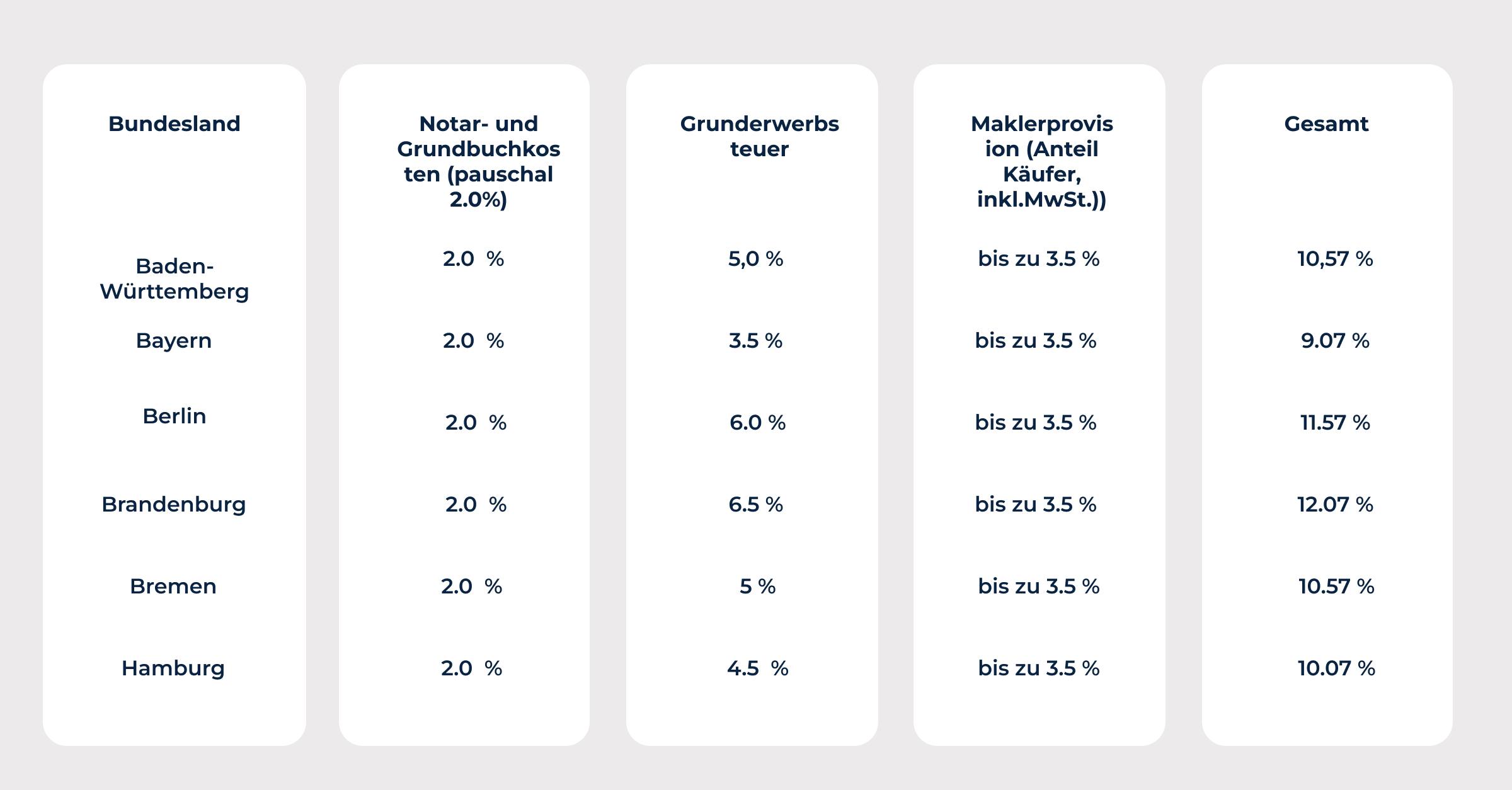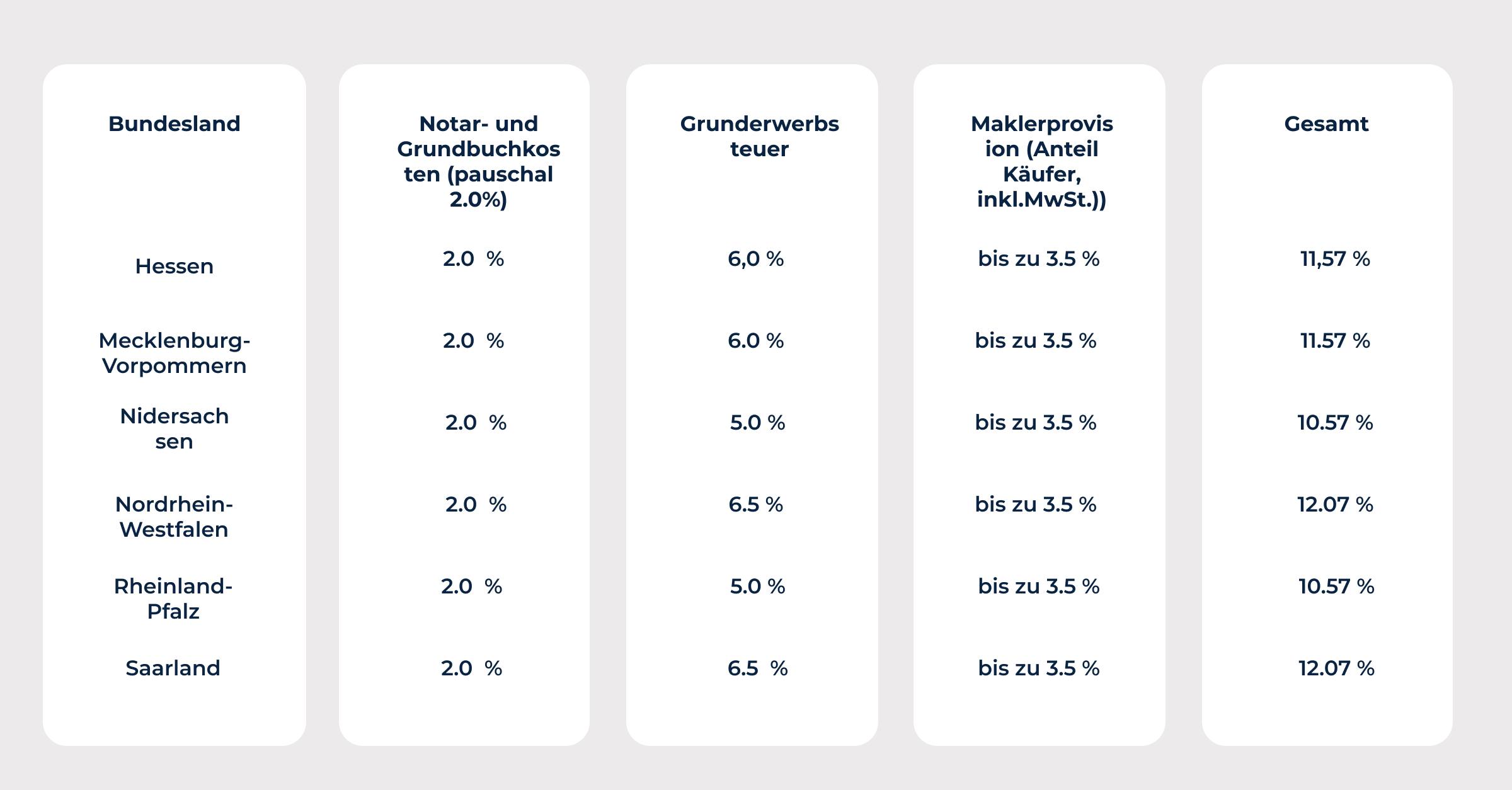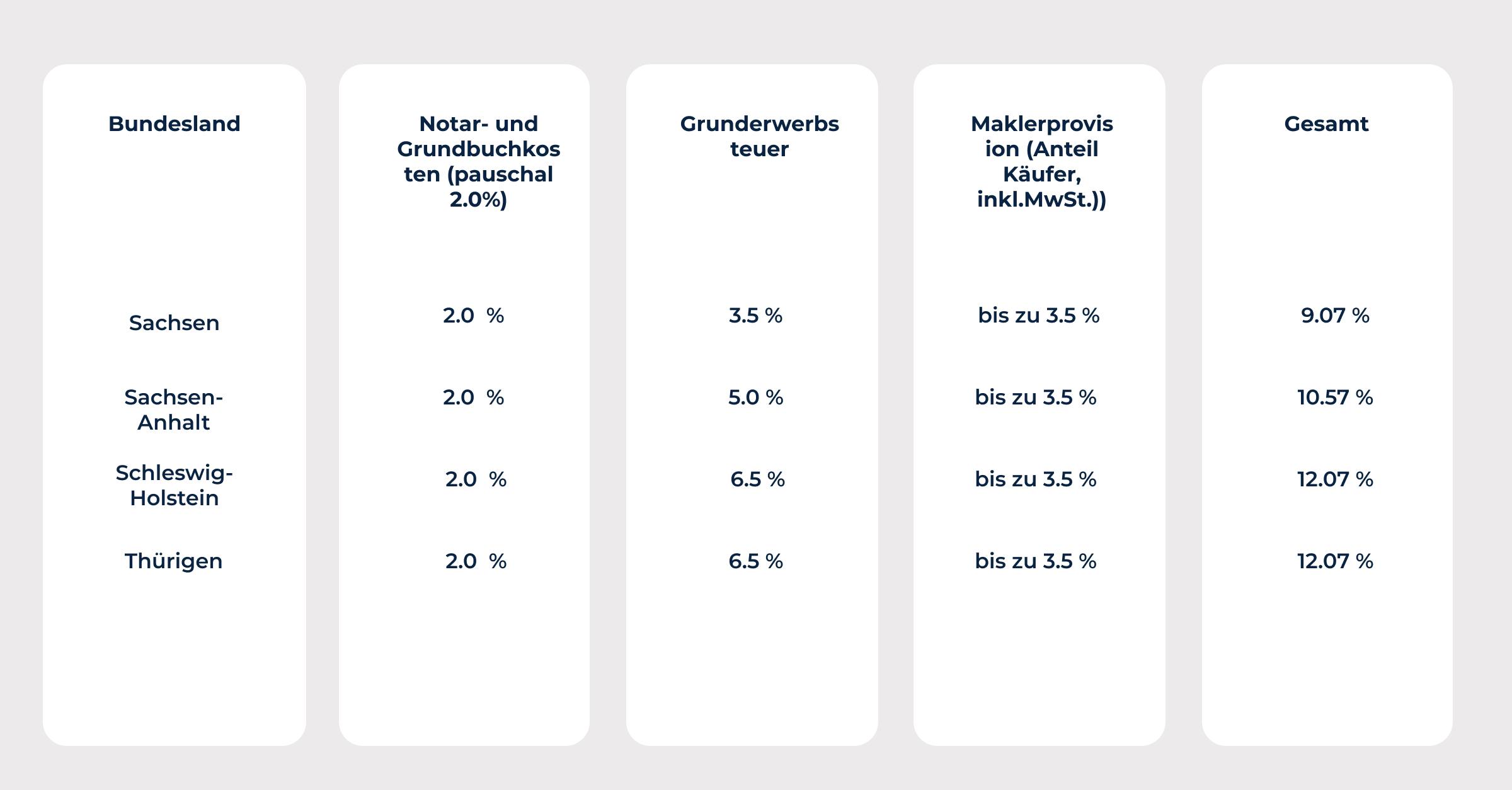The dream of owning a home is a major aspiration for many, though it can also pose a significant financial challenge. Purchasing a house involves not only the buying price but also additional costs such as notary fees, real estate agent commissions, and financing via a mortgage, which comes with interest rates. However, there are also tax benefits that can result from homeownership, such as depreciation or the housing construction subsidy (Wohnungsbauprämie). Ongoing expenses like property taxes and insurance should also be considered.
Building a home incurs extra charges like building permits and development costs for road construction and connections for gas and water. Sewage fees may also apply.
When selling a house, there are important taxes to account for, such as the speculation tax, inheritance tax, and capital gains tax (Veräußerungsgewinnsteuer).
It is essential to research all associated fees (e.g., using a notary fee calculator) and taxes in advance to be financially prepared. Despite the expenses, the dream of owning a home can still be worthwhile for many people.
I. Introduction
- Definition of the "Dream of Owning a Home"
- Reasons why people desire to own a home
- Impact on finances and taxes
II. Financial Aspects of Buying a Home
- Acquisition costs (purchase price, notary fees, real estate agent commissions)
- Financing (mortgage, interest)
- Tax benefits (e.g., depreciation, housing construction subsidy)
- Ongoing costs (e.g., property taxes, insurance)
III. Fees Involved in Home Construction
- Building permits
- Development costs (e.g., road construction, gas and water connections)
- Sewage fees
IV. Taxes When Selling a Home
- Speculation tax
- Inheritance tax
- Capital gains tax (Veräußerungsgewinnsteuer)
V. Conclusion
- Buying and building a home can offer tax advantages.
- It's important to be aware of all potential fees and taxes in advance.
- Selling a home can also result in taxes.
- Nevertheless, the "dream of owning a home" can be worth the financial concern for many people.
The Dream of Owning a Home (Taxes and Fees)
The dream of owning your own home is a significant goal for many people, but it often comes with financial challenges. The process of buying a house includes not only the purchase price but also additional costs such as notary fees, real estate agent commissions, and financing through a mortgage, which involves interest. Additionally, there are ongoing expenses like property taxes and insurance to consider. When building a house, fees like building permits and development costs for road construction and gas and water connections are also incurred.
It is crucial to be well-informed about all associated costs and fees in advance to be financially prepared. Nevertheless, for many, the "dream of owning a home" is worth the worry, as it often brings a sense of security and independence. However, financial considerations are not limited to purchasing or building a house—when selling a house, taxes such as the speculation tax, inheritance tax, and capital gains tax may also apply. This article provides a detailed overview of the financial aspects and taxes involved in the "dream of owning a home."
Further reading: "Why a notary is essential in real estate purchases" can be found here.
Financial Aspects of Home Buying
There are many financial aspects to consider when purchasing a home.
- First and foremost are the acquisition costs, which, in addition to the purchase price, include notary fees and real estate agent commissions. The purchase price is the amount the seller asks for the house. Notary fees are charged for the notary's services, as a notary must be present at the signing of a purchase agreement to notarize it. Real estate agent commissions are the fees paid to the real estate agent who facilitates the purchase.
- Another important financial aspect of buying a house is financing. In many cases, a mortgage is taken out to finance the house. A mortgage is a loan granted by a bank or another lender and is subject to interest. The interest rate depends on several factors, such as the amount of the mortgage, the mortgage term, and the current interest rates.
- There are also tax benefits that can result from buying a house. For example, depreciation on the house can be claimed to reduce the financial burden of the acquisition costs. Additionally, the housing construction subsidy (Wohnungsbauprämie) is a tax benefit available for the purchase or construction of a self-occupied home.
- In addition to acquisition costs and financing, there are also ongoing costs to consider when buying a home. These include, for example, property tax, which must be paid annually, as well as insurance such as household insurance and liability insurance.
It's essential to research all costs and tax advantages before buying a house to ensure you are financially prepared. You can find more information on related topics like founding a real estate limited company (UG) in other articles.
Overview of Common Acquisition Costs in Various Federal States (Germany)

*There may be variations in certain regions.
Breakdown of Costs When Purchasing a Property:
- Purchase Price
- Notary Fees
- Real Estate Agent Fees
- Financing Costs
- Land Registry Entry
- Energy Certificate
- Possible Renovation Costs
- Moving Costs
- Ongoing Costs
Fees Involved in Home Construction
When building a house, there are additional fees to consider beyond the construction costs. One important fee is for the building permit, which is issued by the local municipality or city. The permit outlines the building regulations and requirements for the house. Without a building permit, the house cannot be legally constructed. The costs for a building permit depend on various factors such as the size, type of house, and location.
Another significant fee is the development cost. These are fees for connecting the property to public infrastructure, such as road construction, gas, and water lines. Development costs are typically the responsibility of the landowner and can vary depending on the size and location of the property.
Sewage fees may also apply, especially if the property is not connected to the public sewage system and requires a private sewage treatment plant.
It's crucial to gather all necessary information about the fees associated with building a house in advance to be financially prepared.
You may also find this article interesting: "Transferring Property During Your Lifetime – Save Taxes in 2023."
Overview of Common Acquisition Costs in Different Federal States (Germany):

*There may be variations in certain regions.
Taxes When Selling a House
When selling a house, several taxes may apply. One common tax is the speculation tax (Spekulationssteuer). This tax must be paid if the house is sold within ten years of its purchase and the selling price is higher than the original purchase price. The amount of speculation tax depends on various factors, such as the time between purchase and sale and the selling price.
Another tax that may apply when selling a house is the inheritance tax (Erbschaftsteuer). This tax is due if the house is transferred as part of an inheritance. The amount of inheritance tax depends on several factors, including the value of the house and the relationship between the deceased and the heir.
A third tax that may apply is the capital gains tax (Veräußerungsgewinnsteuer). This tax is payable if the selling price of the house exceeds the original purchase price. The amount of capital gains tax depends on factors like the sale price and the time period between the purchase and sale.
Overview of Common Acquisition Costs in Different Federal States (Germany):

There may be variations in certain regions.
All information on the gift transfer of real estate can be found in our blog article to help save further taxes if applicable.
Conclusion
In conclusion, the "dream of owning a home" can indeed be a significant financial challenge. When purchasing a house, you must consider not only the acquisition costs but also ongoing expenses such as property tax and insurance. Additionally, when building a house, there are fees such as building permits and development costs to account for.
However, there are also tax benefits associated with buying or building a house, such as depreciation or the housing construction subsidy (Wohnungsbauprämie). When selling a house, taxes like the speculation tax, inheritance tax, and capital gains tax may apply.
Therefore, it is important to be informed about all the potential costs and taxes in advance to be financially prepared. Nevertheless, for many people, the "dream of owning a home" is worth the concern, as it often brings a sense of security and independence.
Related Questions
How much tax do you pay when buying a house?
The amount of tax that applies when buying or selling a house depends on various factors, so it can't be answered definitively.
When buying a house, taxes generally do not apply unless the house is sold again within ten years of purchase, in which case the speculation tax must be paid. The amount of speculation tax depends on factors such as the time between purchase and sale and the sale price.
When selling a house, capital gains tax may also apply if the selling price is higher than the original purchase price. The amount of capital gains tax depends on the sale price and the time period between purchase and sale.
It is therefore important to be informed about the applicable taxes in advance and consult a tax advisor if necessary.
What are the costs of buying a house in Switzerland?
When buying a house in Switzerland, several costs can arise. Firstly, there are acquisition costs, which include not only the purchase price but also notary fees and real estate agent commissions. The purchase price is the amount the seller asks for the house. Notary fees are paid for the notary’s services, who must be present at the signing of the contract to notarize it. The real estate agent fees are commissions paid to the real estate agent for facilitating the sale.
Real estate agent fees, on the other hand, are commissions paid to the real estate agent who assists in facilitating the purchase of the property.
Another key financial aspect when buying a house in Switzerland is financing. In many cases, a mortgage is taken out to finance the purchase. A mortgage is a loan granted by a bank or other lender and is associated with interest. The interest rate depends on factors such as the amount of the mortgage, the loan term, and the current interest rate.
There are also tax benefits when buying a house in Switzerland. For example, depreciation on the house can be claimed to reduce the burden of the acquisition costs. Additionally, the housing construction subsidy (Wohnungsbauprämie) is a tax benefit granted for the purchase or construction of a self-occupied home.
Besides acquisition costs and financing, there are also ongoing costs that need to be considered when buying a house in Switzerland. These include, for example, property tax, which must be paid annually, as well as insurance like household insurance and liability insurance.
It is crucial to gather all necessary information about the costs and tax advantages before buying a house in Switzerland to be financially well-prepared.
What Should I Consider When Buying a House?
There are several important factors to consider when purchasing a house:
- Location: The location of the house is crucial. This includes not only the city or region where the house is located, but also specifics like the street, proximity to amenities such as shopping centers, schools, and public transportation.
- Condition: The condition of the house is equally important. Check for potential renovation needs and be aware of any damages or defects that may need repair.
- Financing: Before purchasing a house, it's essential to plan your financing. You may need to take out a mortgage, and it’s wise to explore different financing options. Consulting with a financial advisor is recommended.
- Purchase Agreement: When buying a house, it's important to have a well-drafted purchase contract. The contract should cover all key details, including the purchase price, the condition of the house, and the payment terms.
- Personal Use vs. Investment: Consider whether you plan to live in the house yourself or rent it out. There are different considerations and pros and cons for each option that should be evaluated.
Being well-informed and thoroughly prepared before entering the purchasing process will help avoid unexpected issues later on.
How High Are Property Transfer Tax and Notary Fees in Baden-Württemberg?
The amount of property transfer tax and notary fees in Baden-Württemberg depends on various factors and cannot be determined with complete accuracy without specifics.
Property transfer tax in Baden-Württemberg is currently 3.5% of the purchase price. However, there are exceptions, such as reduced tax rates or exemptions for intra-family transfers or transfers involving agricultural or forestry properties.
Notary fees typically amount to about 2-3% of the purchase price and depend on factors such as the purchase price and the property value.
Es ist daher wichtig, sich im Vorfeld über die anfallenden Grunderwerbsteuer und Notarkosten zu informieren und gegebenenfalls einen Steuerberater oder Notar zu konsultieren. Es lohnt sich auch, verschiedene Angebote einzuholen, um die Kosten zu vergleichen.
It’s advisable to get a precise estimate for your specific case by consulting a tax advisor or notary. Additionally, it can be beneficial to compare various offers to better understand and potentially reduce costs.
Property Transfer Tax by Federal State in Germany
The property transfer tax in Germany varies between federal states, ranging from 3.5% to 6.5%.
Here’s an overview of property transfer tax rates across German states:
- Baden-Württemberg: 3.5%
- Bavaria: 3.5%
- Berlin: 6.0%
- Brandenburg: 6.0%
- Bremen: 5.0%
- Hamburg: 4.5%
- Hesse: 6.0%
- Mecklenburgestern Pomerania: 6.0%
- Lower Saxony: 5.0%
- North Rhine-Westphalia: 6.5%
- Rhineland-Palatinate: 5.0%
- Saarland: 6.5%
- Saxony: 3.5%
- Saxony-Anhalt: 5.0%
- Schleswig-Holstein: 6.5%
- Thuringia: 6.5%
These percentages are general estimates. As with the notary fees and other property purchase-related expenses, it’s important to verify the details specific to your situation. Seeking advice from a professional, such as a tax advisor or notary, is highly recommended.
Notary Fees by Federal State in Germany
The amount of notary fees in Germany can vary from state to state and depends on several factors, such as the purchase price and the value of the property.
It's challenging to give an exact figure for notary fees in each federal state since they differ from case to case. However, in general, notary fees typically amount to around 2-3% of the purchase price.
It's essential to keep in mind that notary fees are influenced not only by the state but also by the type of purchase contract and the scope of the notarial services provided. For example, fees for property sales, mortgage agreements, and additional legal services may vary.





